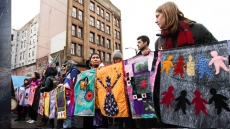OTTAWA — People with serious criminal records and others using potentially phoney addresses are among those who managed to secure Canadian citizenship, thanks to a system that doesn't do enough to root out fraud, the auditor general has found.
Michael Ferguson's audit of citizenship applications between July 2014 and last fall found the Immigration Department has granted citizenships based on incomplete information or without all the necessary checks because it's not applying its own methods to combat fraud.
The issue isn't the department's alone — the auditor general found they weren't getting timely or enough information from border officials or the RCMP either to help flag suspect cases.
"This finding matters because ineligible individuals may obtain Canadian citizenship and receive benefits to which they are not entitled," Ferguson wrote in his spring report, tabled Tuesday in the House of Commons.
"Revoking citizenship that should not have been granted takes significant time and money."
The problems range from immigration officials not routinely checking travel documents against a database of known fake papers to a failure by officers or their computers to flag problematic addresses that could point to residency fraud..
In one instance, it took seven years for official to cotton on to the fact a single address had been used by at least 50 different applicants during overlapping time periods. Of the 50, seven became Canadian citizens.
A review of 49 cases where an individual's address had been flagged as problematic concluded that in 18 instances, citizenship officials didn't follow up to see if the applicant actually met residency requirements.

In four cases, the RCMP failed to tell the Immigration Department about criminal charges laid against people who'd already passed the criminal records check step of the citizenship process. Two eventually became citizens; a third failed the knowledge test while the fourth abandoned their application.
The auditor general also found four people who should have been ineligible because of their criminal records, but were granted citizenship even though the officers had access to the information.
It was not immediately clear Tuesday whether any of the red flags raised by the auditor general's office have resulted in new fraud investigations.
In response to the audit, the Immigration Department, Canada Border Services Agency and the RCMP all say they are working to improve their efforts and a better system should be in place by the end of this year.
Tuesday's collection of audits also flagged problems at the start of many people's path to citizenship — the Immigration and Refugee Board, which handles asylum claims.
As part of a review of appointments to government tribunals, the auditor general found ongoing and lengthy vacancies at the IRB, as well as at the so-called specific claims tribunal, which handles decisions on First Nations claims against the Crown.

In both cases, the vacancies are contributing to delays in tribunal decisions — at the IRB, 21 positions are vacant, leading to wait times of an average of 18 months, up from the last study of the appointments process in 2009.
When it comes to filling vacancies, the auditor general flagged the fact that for part-time positions, there was no evidence of a selection process or an assessment of candidates against required qualifications.


